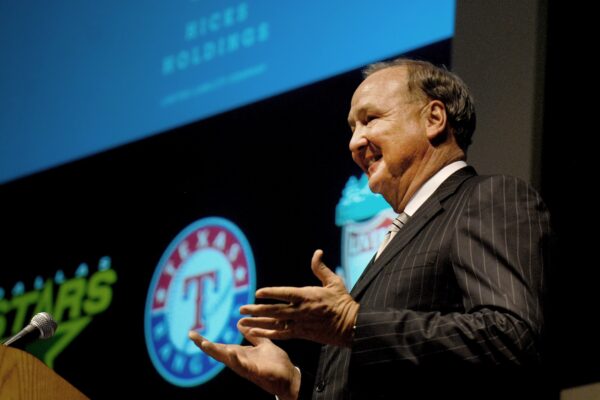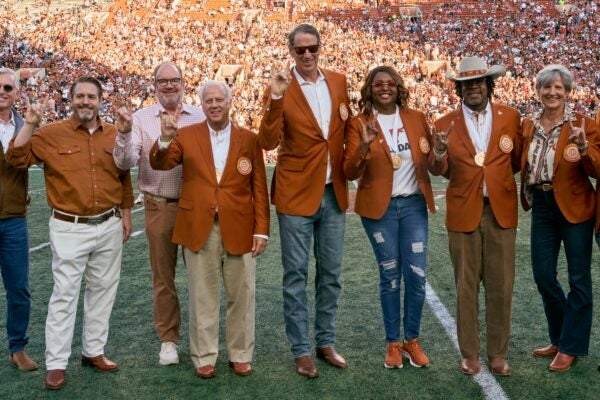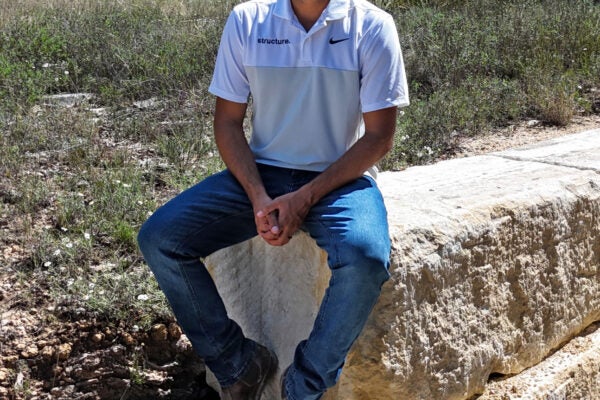Creating the Workplace of Tomorrow
Serial entrepreneur Brett Hurt, BBA ’94, sees flexible work environments and inclusivity as keys to success. A conversation with the co-founder and leader of data.world and Bazaarvoice.
By Sharon Jayson | Photos by Drew Anthony Smith
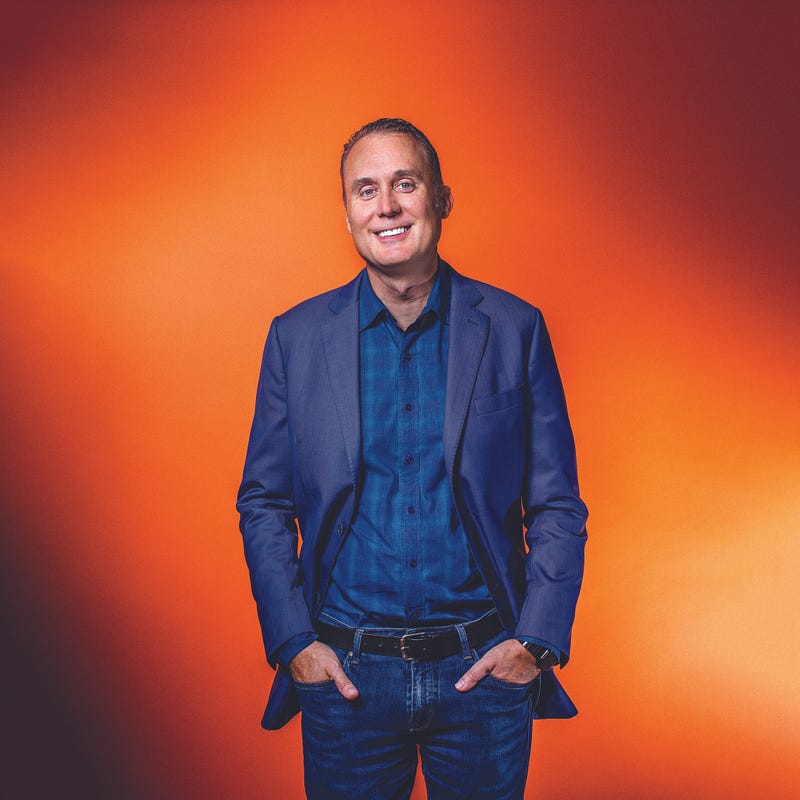
Austin native Brett Hurt, BBA ’94, deployed his natural positivity when COVID-19 upended life as we know it.
“There was just a lot of fear going into it, because I thought I’d become a successful entrepreneur by us being in person, motivating teams in person and having that high-fidelity camaraderie and interactions — and now, all of a sudden, we’re all going to do this from home,” says Hurt, co-founder and CEO of data. world, a cloud-based data catalog company that in 2015 was his most recent in a string of entrepreneurial ventures.
Confronted by the unknown, Hurt says he could never have imagined how much would change so quickly. But he took to heart his wife Debra’s belief that “everything’s going to be fine with your company.” And it was.
“In hindsight, the pandemic turned out to be the greatest accelerant in the history of technology,” he says, noting that his startup was trying to raise $10 million just as the pandemic hit. Instead, it attracted big investors so that by fall 2020, it had actually raised $26 million, including from customer Prologis, the world leader in logistics real estate. The company raised another $11 million in May, led by Vopak, one of its customers and the world leader in energy storage.
Hurt has had a hand in creating companies that have become top-rated global leaders, including co-founding Bazaarvoice, a marketing technology company that became the largest public SaaS (Software as a Service) business in social commerce. When it went public in 2012, Bazaarvoice was valued at over $1 billion, and The Wall Street Journal named it one of the top five IPOs of that year. He earlier founded Coremetrics, a pioneer in marketing analytics that was acquired by IBM in 2010.
Austin-based data.world calls itself “home to the world’s largest collaborative data community.” The additional funding was to expand its team and products. Data.world offers open data sets free to the public, while companies buy packages to help them manage and organize their private data to enhance efficiency, meet governance and compliance requirements, and provide valuable business insights. Hurt says he made sure data. world became a Certified B Corporation, a voluntary designation that says a company meets “the highest standards of verified, overall social and environmental performance, public transparency and legal accountability.”
Data.world has repeatedly been cited as one of Austin’s best places to work by the Austin Business Journal and for its commitment to diversity and inclusion. Hurt says he’s proud that 55% of his employees are women or minorities. His fascination with technology is almost lifelong. His mother and paternal grandfather joined forces and bought him his first computer when he was just 7.
His mother, Brenda, learned to program with him and drove him to programmer user group meetings, where, despite being the youngest person there, Hurt was unafraid to interact with game designers and other enthusiasts. She also fended off those who discouraged this techie-in-the-making for his singular focus.
With Hurt’s local roots and ties to The University of Texas — his grandfather James Mann Hurt had taught mathematics here — he earned his first degree at the Forty Acres and then headed to the Wharton School at the University of Pennsylvania for an MBA in high-tech entrepreneurship. Since then, he’s not only practiced what he learned; he’s paying it forward with a host of volunteer activities, including a yearlong stint as a Texas McCombs entrepreneur-in-residence, offering his expertise for the next generation. He and Debra co-own Hurt Family Investments, which is involved in a variety of startups, VC funds, and philanthropic pursuits to benefit the local community. Among 119 startups that they invest in directly, 73 are in Austin. The couple received the LBJ Humanitarian Award in 2014 for their dedication to public service and philanthropy. Hurt was also named a Henry Crown fellow and Braddock scholar by the Aspen Institute. He serves on a variety of nonprofit boards and helped establish the Bazaarvoice Foundation. He says he believes business leaders have a responsibility to better the world, not just make profits.
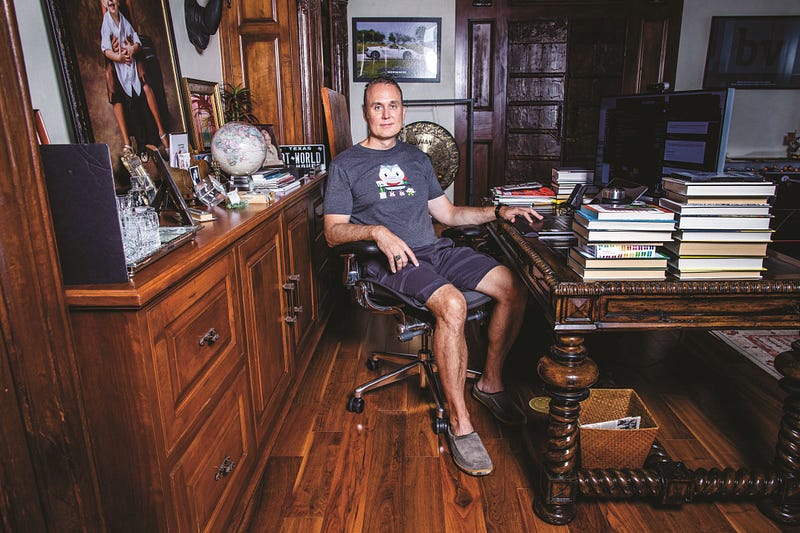
Hurt is an idea guy and a prolific writer. He blogs on several platforms, including Lucky7.io, so named because, as he says, “How lucky am I that I found my passion at age 7, encouraged by my mom.” His blogging covers an array of subjects from business and entrepreneurship to exercise and health, technology, vegetarian- ism, and occasionally his family. He shares his thinking on entrepreneurial success in a free e-book, The Entrepreneur’s Essentials, which he completed in 2019, on Medium.com.
Now, the serial entrepreneur who has founded six startups and is sought after as a thought leader offers his take on the future of work and entrepreneurship. McCombs magazine spoke to him about inspiring workers, adapting to change, and the pandemic’s long-term effect. His responses have been condensed and edited for clarity.
What does it take to be an entrepreneur and get ideas funded these days?
There’s a plethora of capital and it isn’t so location-bound, thanks to the pandemic (one of the few silver linings). It is easier to get great companies and ideas funded no matter where they are. That used to not be the case, and many felt the gravitational pull toward Silicon Valley. Of course, grit and resilience are more important than ever as entrepreneurial traits, but that has always been the case.
You’re known as an innovator. What do you envision for the future of work that you’d like to try at data.world?
I really think Mondays and Fridays in the office and Tuesdays through Thursdays wherever you want to work is going to hit the sweet spot. You’re leveraging the best of in-person-ness with the best of remoteness.
Has the pandemic forced you as a CEO and co-founder to rethink your workplace?
We decided after lots of polling of our team members to keep the office. We want a hub where we can meet with customers and prospects and have in-person gatherings, parties, the rest. We’ve kind of accepted that we’re going to be in a hybrid world from now on. We’re just saying that, if you make the commute, the majority of the people will be there. Mondays are a very meeting-heavy day. We’re in the office for that so they have that high-fidelity interaction. Friday tends to be a more celebratory day. That’s a great day to be in person together, to feel the camaraderie, to close out the week.
The most difficult thing is connecting with the people you’ve hired during the pandemic. You’ve never gotten a chance to be in person with them because you prioritize safety. There is a bonding that occurs when we get together in person.
Surveys suggest millennials and Gen Z like working remotely but are concerned about missing opportunities to collaborate with colleagues. What are you hearing from your younger workers, and how do they differ from other employees?
The youngest people are the ones going in the office the most. Actually, I think almost all of them don’t have kids. We do have some going into the office who do have kids, but those are the ones like myself whose kids are fully vaccinated. Another thing that we’ve done during the pandemic is that 15 of the people that we hired during the pandemic don’t live in Austin. You know, it really has allowed us to pick up people who live elsewhere.
How has the pandemic changed work at data.world?
We had to get creative and intentional about checking in on people’s mental health. We spent a lot of time reminding people that our benefits include mental health coverage. There were a lot of things that we did during the pandemic to try to bring the best of what we enjoyed in the office (to employees at home). We would have different snacks delivered; we would do things like get together on Zoom and play different games together; we had a magician, which sounds like it’d be lame over Zoom, but he was absolutely amazing — like one of the best magicians I’ve ever seen online or offline.
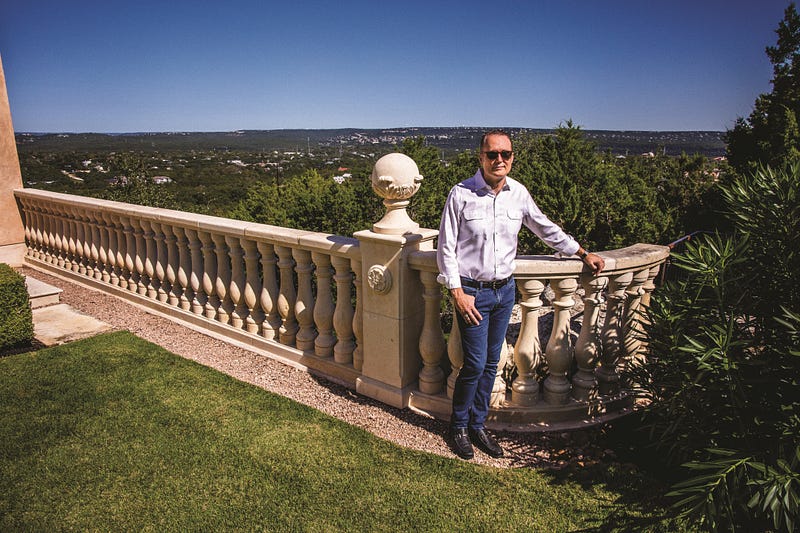
What are the biggest challenges you’ve faced as a company leader during this time?
A: The most difficult thing is connecting with the people you’ve hired during the pandemic. You’ve never gotten a chance to be in person with them because you prioritize safety. There is a bonding that occurs when we get together in person. It’s going to be a very difficult thing for large companies in terms of retention and everything else. You’ve heard of this thing called “the great resignation.” I think part of what can cause this is people taking on jobs where they’ve actually never met in person. It’s almost like they could look at it as if they’re playing a video game or something.
How do you decide what organizations— profit and nonprofit — to invest in?
On the nonprofit side, our philanthropy has grown organically. And it’s been focused around education, Israel, primarily Jewish causes. On the for-profit side, the primary businesses that we’ve invested in are Software as a Service companies, and we primarily focus on Austin. When my wife and I lived in Silicon Valley, I learned the entrepreneurs out there that started the original venture capital firms really gave back in the form of know-how and capital to the next generation. That’s what created Silicon Valley. And when we became wealthy after Coremetrics sold and Bazaarvoice went public, we felt this duty to give back locally. And we’ve got one of the best portfolios to show for it. If we were a venture fund, we’d be in the top 10% or so. But the primary reason we went into it was to help. It’s been a real joy to do that.
Last year, you wrote an open letter to the tech community about diversity and inclusion. Why did you do that, and how was it received?
It was the most popular thing I wrote in 2020. It was a long journey to get there. The Henry Crown Fellowship got me toward that. “Courageous Conversations Beyond Diversity” is a training course that had a big impact on me. Another big impact, which I would have never probably thought to get involved in had it not been for the pandemic, is that after the murder of George Floyd, a very good friend recruited me into a group of leaders who are very committed called White Men for Racial Justice. And we go through a lot of learning together and have guests and people who are experts on race. It’s kind of like when I became a vegetarian. The more I learned about factory farming and what the truth was about my plate, the more I realized I can make choices. And I can lead by example. The more I learned, the more I was like, “Hey, how can I best effect change in the country?” Well, I can effect change by stepping up and writing this letter and us being one of the most diverse companies in the history of tech in America.
How can companies cultivate a more diverse and equitable workforce?
I hear all the time from people, “I just can’t find a candidate.” One of the big points I make in the letter is, if you want to build a diverse team, you better start showing up at diverse places.
What industries will lead in innovating for the future of work?
If we’ve learned nothing else during this pandemic, our digital future is here to stay, and it’s just been accelerated by 10 years. A lot of industries are definitely trying new things. WeWork is a good example. Maybe that model is going to work really well coming out of this because people aren’t going to need as much physical office space, and we’re going to like collaborative hubs like that. Movie theaters are redesigning themselves around full experiences, not just watching the movie but having dinner and a night out, like our local Alamo Drafthouse. I’m biased being an Austin native, but I think they have the best model, and that’ll become more the norm for movie theaters. And it’s smart because it’s a better business model. There’s a lot more upsells of customers if you have food and drink. So, I think that’s going to be a big, big thing. There’s also this redesign of conferences. We always went in person. If you could sell the same amount of tickets — let’s even say you sell fewer tickets for people attending in person — there are all these additional tickets you can sell for people who want to tune in virtually. I think that’s here to stay.
With the anticipated return to work, are you concerned about business travel being a big loser since we’re used to meeting virtually?
We haven’t even needed to worry about that because there’s just so little of it. We’re only a hundred people. I do think that we’ll have a long-term suppression of business travel and business hotels. I do think that’s going to take a long time to come back. Conferences are going to become much more important. They’ll be the hub where you’ll meet with a prospect or partner in person. And then you can get the rest of the interactions done over Zoom. A lot of business travel permanently fades away.
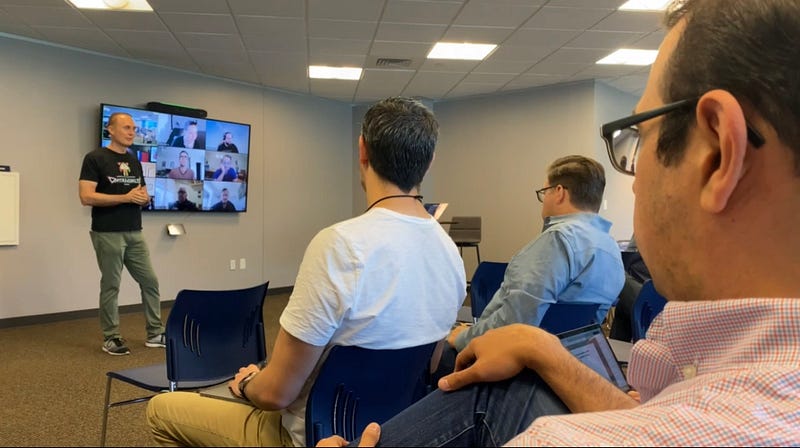
There’s hope we’ll be returning to a more normal life in 2022. How do you think the overall workplace will change as a result of the pandemic?
The tech companies will be remote-first and hybrid. The bigger tech companies will pull people together like we do for our quarterly all-hands meeting to really build up the camaraderie, but it will be more remote than a small company like data.world. The reason I believe that is, it’s just been so long. People’s behaviors have adapted to this flexibility. I think that the world, for the most part, is better off from a work perspective because of the pandemic. I know it’s a weird thing to say, but I really believe that. It’s forced us to adapt to how to communicate and how to get work done remotely, while increasing the time that we have with our family and at home. It’s very, very different now, and every industry is also so different. You can’t just make a lot of blanket statements.
How has the tech ecosystem in Austin changed? What do new companies here need to succeed?
There are more VCs and incubators in Austin than ever combined with a thriving angel investor ecosystem. New companies need to have even more sources of capital, and that will come quickly as we have more and more examples of great investment returns. It has always been the case that you need great capital and people to have your company succeed, and with how much capital and talent has moved here, accelerated by the pandemic, we are well on our way.
This article appeared in the spring 2022 issue of McCombs magazine. Click on the link to see the full issue.
About this Post
Share:
